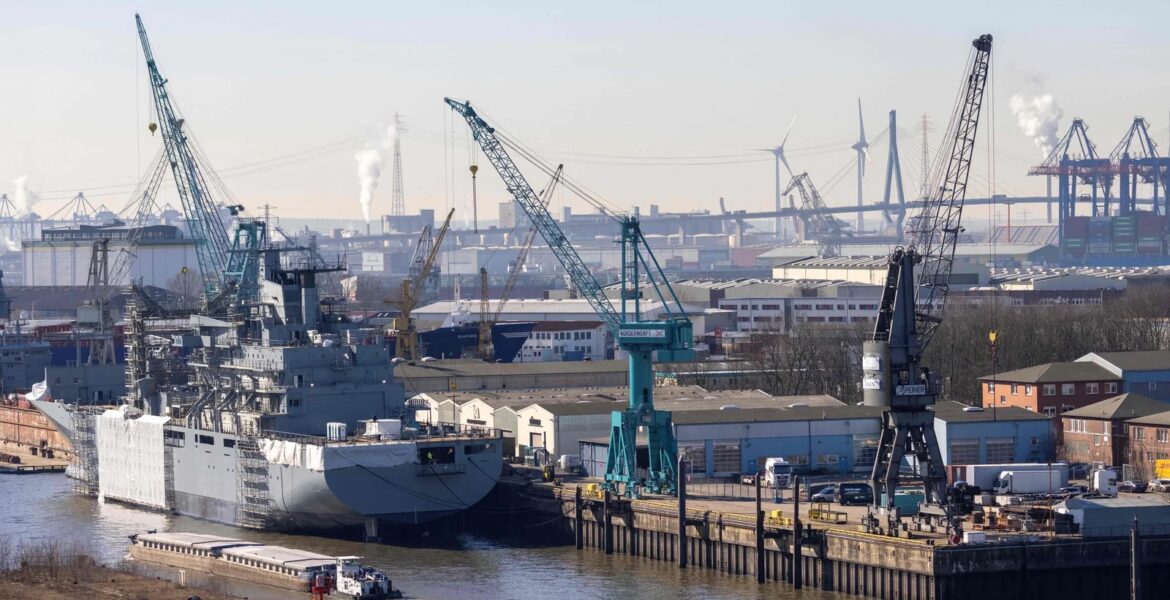The German government has backed a controversial deal allowing Chinese state-owned shipping giant Cosco to buy a stake in a terminal at its busiest port, despite multiple federal ministries warning that it would be a national security risk.
Chancellor Olaf Scholz’s cabinet on Wednesday gave the green light to a compromise whereby Cosco would buy a stake “below 25 per cent” of Tollerort container terminal, owned by Hamburger Hafen und Logistik AG (HHLA).
The Chinese company wanted a 35 per cent stake, a purchase that would have automatically gone through at the end of October had the cabinet not struck a deal.
At this reduced stake, Cosco will have no voting rights at the port, the economic ministry said.
The port saga has become a huge story in Germany, and has exposed deep divisions on federal China policy among the three-way coalition which came to power last year.
Chancellor Scholz, a Social Democrat and the former mayor of Hamburg, has largely followed predecessor Angela Merkel’s policy of maintaining strong trading ties with China, even as European Union officials warned that Berlin was set to repeat the mistakes of the past, in reference to its reliance on Russian energy.
The Greens and Free Democrats (FDP), the two junior coalition partners, advocate a tougher policy towards China and opposed the deal, which officials have said leaves Germany more vulnerable to “blackmail” and economic coercion by China.
Germany’s economic ministry – run by Green Party co-leader Robert Habeck – said in a statement that the “reason for the partial prohibition is the existence of a threat to public order and safety”.
A leaked economic ministry memo, published by the German tabloid Bild, said banning the transaction would “prevent an alternative transport network from developing in Europe based on Chinese ideas and objectives”.
Cosco has been rapidly building up its European port assets in recent years. It owns stakes in Rotterdam and Antwerp, the two largest ports in Europe, owns Piraeus Port in Athens, as well as a controlling stake in a terminal in Belgium’s Zeebrugge port.
It is also sponsoring the construction of Europe’s largest inland container terminal at the German riverport of Duisburg, known as the end of China’s Belt and Road scheme.
Frank Müller-Rosentritt, a member of the German parliament Bundestag’s Foreign Affairs Committee and the FDP’s standing rapporteur on China, said the compromise was “just marginally better than awful”.
“For Scholz, the port of Hamburg may be an economic project; for Beijing, a stake in Europe’s third-largest port is another piece of the puzzle in Xi Jinping’s geopolitical power game,” he told the Post.
“While we are debating if and how much control we might be willing to sell to China, a German participation in a Chinese harbour would unequivocally be blocked by Beijing. If they fear German involvement in their critical infrastructure, should we not be mortified by Chinese involvement in ours?” he added.
The ruling comes as Scholz prepares to become the first Western European leader to visit Beijing since before the coronavirus pandemic.
He will visit the Chinese capital for an audience with Xi during the first week of November, ahead of a trip to the G20 Leaders’ Summit in Bali.
Scholz confirmed last week that he would bring with him a delegation of German businesses, a decision which has drawn criticism in Germany, and from around Europe.
A government spokesperson said on Wednesday that the decision has “nothing to do with the chancellor’s upcoming China trip”.
On both fronts, Scholz has shown a willingness to buck political, academic and public opinion to maintain strong trading links with China.
Speaking at last week’s European Council summit in Brussels, he said “we are liberal democracies, and have no illusions about who we are dealing with”.
There had been “no vote on deglobalisation or to get out of China” when the leaders of the EU’s 27 member states discussed China for the first time in 12 months, Scholz said.
Fifty-five German sinologists wrote a letter to Scholz on Tuesday, published by the newspaper Zeit, warning that the sale “would play into the hands of a regime that has suppressed its people ever more ruthlessly in recent years, and it harbours a political risk for Hamburg and Germany that far outweighs the hoped-for economic advantage”.
Meanwhile, research shows the German public also wants the country to reduce its economic dependencies on China.
A poll by Der Spiegel, a German magazine, found 81 per cent of German citizens are “against Cosco’s participation” in the port, with just 13 per cent in favour.
A new report by Körber-Stiftung, a Hamburg-headquartered think tank, showed that 66 per cent of Germans believed it should “reduce its economic dependencies on China, even if this leads to economic losses”.
The survey showed that 59 per cent of Germans viewed China’s international influence negatively, up from 34 per cent in 2017, while just seven per cent saw it in a positive light.
The report’s author, Julia Ganter, said these data showed that the public would back Scholz if he took a tougher line on Hamburg port.
“I think the chancellor could be a little more brave when it comes to this, public views on China have been deteriorating since 2017,” she said.
William Klein, a former senior US diplomat in Beijing, said American officials would be “asking questions about the timing of the visit and the port deal”.
“They will probably be hoping for reassurances from the German government, that it is going with its eyes wide open into this visit, as well as into this potential port deal in Hamburg,” Klein said.


